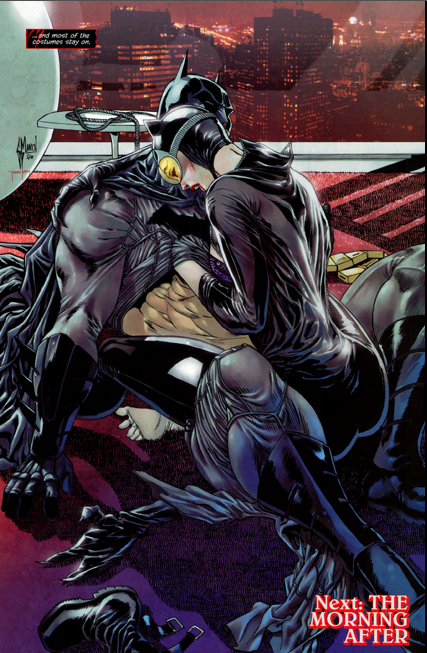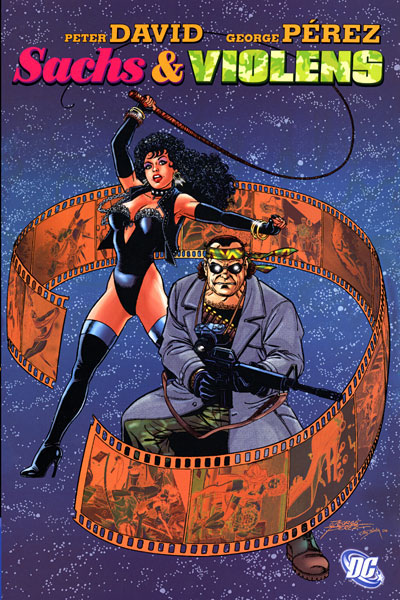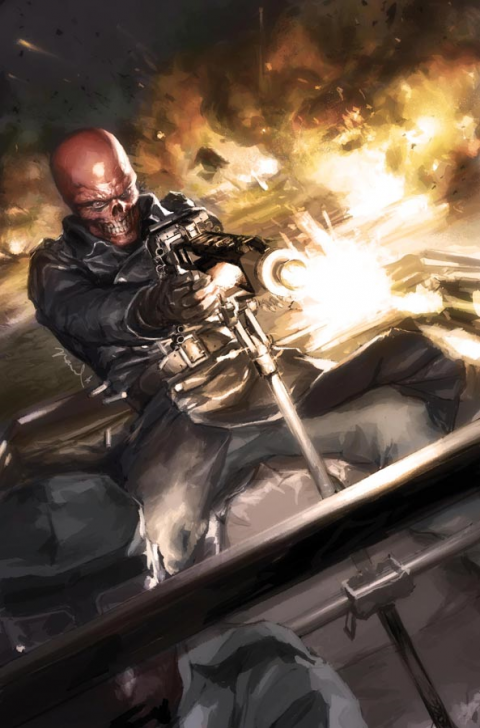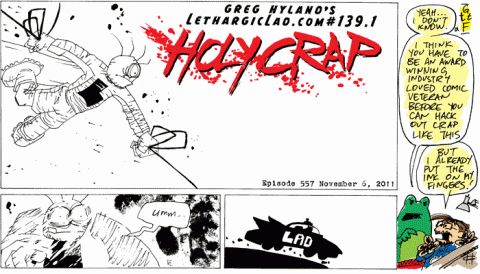Back by popular demand, Comic Book Daily asks the question and the crew (and special guests) give their answers. Tip of the hat goes to Scott VanderPloeg for this week’s question.
[box type=question]Violence, scantily clad women, sexuality, Batman and Catwoman’s recent escapades, etc. This weeks 52Q: Is adult subject matter in comics hurting or helping its ability to reach new readers?[/box]
Kevin Boyd
It’s contextual really.
If you are asking if it’s okay for mainstream superhero comics publishers to elevate the amount of violence, sexuality and scantily clad women in their regular offerings — thinking that this will make their comics sell better, then I would say no, it isn’t okay. It’s lazy writing and further removes younger readers from the equation. Mainstream comics should have general appeal.
BUT just like we have r-rated movies and HBO and Showtime making shows with adult content, I have no issues whatsoever with graphic novels and comics that address adult (only in the sense that only adults can buy and read) subjects so long as they are properly marked as such.
Scott VanderPloeg
Let me emphasize the end of my question: “its ability to reach new readers“. DC’s new 52 was meant to rejuvenate its comics line and bring new and old readers into the fold. Unfortunately they didn’t really do anything for young readers or focus on mature content, so the new line can only be perceived as all ages. Batman and Catwoman having sex eliminates those young readers, as does the high body count and frequent killings.
Greg Hyland
Violence and scantily clad women are nothing new in comics, so why would it attract new readers now? I think DC had it in there for two reasons- to get some sort of “buzz” going (there was a a lot of talk about the Red Hood comic… however I haven’t heard anything said about the second or third issues) and because it’s easy to write the “same-old same-old.” DC said a lot about trying to attract new readers, which they did, but I think in the short term. They made next to no effort, in what I saw, to attract women or a younger audience. It would take work to make books that would attract those two audiences and it’s a lot more fun to just design new costumes. What they got was a lot of “returning readers”, like me. However, by the fourth month, I’ve dropped over 52% of the titles I first picked up.
So wait, did I answer the question? I’d say that all-in-all, the violence and sexuality neither helped or hurt attracting new readers, the hype around the “event” is what attracted new readers. However, the mediocre level of the books themselves are going to prevent new readers from staying with the books.
Ed Campbell
I think the challenge is only people who buy comics are going to buy comics. It doesn’t matter what tricks or gimmicks are used, there is no easy way to con people into becoming a comic book reader unless they want to . Sex and violence is just a gimmick, like killing off heroes and new costumes. Eventually it gets tired and the publishers will have to find another gimmick to get people interested.
Laura Thomas
Totally depends on the comic! Well known characters doing things that are a little shocking makes news, people hear about it, and come in and buy a comic they may not of in the past. If even 1 out of 100 people who bought it just for the adult content keep reading it after the initial issue, it’s helping. New readers are new readers. It’s working for Catwoman, people are buying it from us like crazy.
As for comics that are new properties and come out of the gate with all sorts of crazy rapey violence, they don’t sell well for us. People just don’t care. Not hurting, but not helping either.
Stanley Jon
Is DC trying to get brand new readers to read its comics or old DC readers who just stopped reading its comics for whatever reason? I think it is the latter and I do not think the majority of them care whether the stories are more mature. Comic stories have adult subject matter for a very long time. The old readers would have been reading them before they stopped reading comics.
Daniel Champion
I think it’s helping.
The more boxes the publishers tick = the more chance they have of appealing to… ‘someone’. Having said that, it’s definitely in the interests of the publisher to protect the innocence of the younger readers – and somehow monitor the access to such books.
It only works on a book like Catwoman because:- Batman himself comes in many different forms these days. They cover a range of angles for all types of Bat fans with 4 different ‘core’ series’ (I think?? Detective, Batman, Batman and Robin and Dark Knight) all offering something slightly different from the last. A second tier book in the ‘Bat family’ can afford to push some boundaries due to the amount of choice. It would be less appropriate if it appeared in a mainstream book that only has one series – as readers of all ages/tastes would be forced to consume it.
If done correctly (ie:- maturely and respectfully) it helps… in my mind.
Anthony Falcone
It is completely hurting the industry. You only have to look at a sales sheet to see that.
The bulk of the industry is superhero comics. They are the main genre. They are also for children. The characters were designed for children, the stories were written for children, and the target audience was children and youth and the disposable income they may have from an allowance or paper route. Sure, some of the stuff was childish, but some of it was just good stories that anyone of any age could enjoy.
But kids grow up and don’t buy comic books. That used to be okay, because those kids would be adult who had kids and then bought comic books for their own children to continue the cycle. It used to work pretty well.
Then someone decided (maybe Frank Miller) that comic books shouldn’t be for children. That this was a serious medium and should be treated as such. So in reality Batman is grim and gritty and likes to break bones and bone chicks. YES, YES, YES! That is the Batman I want to read. Not that pussy I read as a kid. But this one!
Oh wait, now when I have kids I can’t share my childhood love of Batman with them because as a parent I might not want them reading current Batman comics.
So kids don’t buy comic books anymore. But 30, 40, and 50 year olds do because they want grim and gritty stuff. They want adult stories. Who can blame them? They should get adult stories.
But here’s the thing: if you want more adult stories you should make more adult stories. Original ideas. You should not take existing PG superhero stuff and turn it into R rated fluff because adults are the only ones reading comic books.
Disney doesn’t make Minnie and Mickey have sex because that isn’t the story for their target audience. And their target audience keeps growing up but is replaced by a new generation.
Pretty soon all the old farts reading comic books will die and without bringing in new generations to the joys of opening up that splash page the industry will not be able to grow.
Shelley Smarz
The change in subject matter is creating a couple of controversies, which is temporarily pushing up the sales for those books (Catwoman and Red Hood and the Outlaws) both of which were up 6% over the #1 issues. So, yes, controversy sells. But this isn’t sustainable in the long run because – as I see it – you have two issues to overcome:
1. Yes, the current subject matter is becoming more adult-oriented. However, this shift is coming about 25 years too late. In North America, unlike in Japan and in Europe, comics are seen as the last bastion of adolescent masculinity. This is thanks to the giant moral panic instigated by Fredric Wertham and the resulting censorship of material by the Comics Code Authority successfully turned texts that were being consumed by adults, into a medium that was for children. And children purchased them. But, when those children grew up, they abandoned the form because the material no longer interested them. Sure, there were some die hard fans who kept reading, buying, and collecting (and the 1990s investor-craze helped as well) but it was difficult for the medium to shake its old image.
Things got grittier and more violent in the 1980s, but this was quickly relegated to mature audiences in a niche market (Marvel Max titles; DC’s Vertigo imprint, etc.) so that, while there was some overflow of these more mature themes into mainstream comics, they were still safe little reads that wouldn’t corrupt the minds of little kids. (And, yes, I realize that this is a HUGE over-generalization of the history of comics.) Had the industry not held on to the Code, I think that the medium could have grown and matured to embrace new adult readers in terms of content and this would have diversified the offerings in terms of genre. Manga, the more adult-oriented (non-superhero) imprints (Vertigo), Underground Comix, and graphic novels (Maus, Perspolis) have demonstrated that there was a market for adult comic books but even these texts couldn’t get over the “comics are for kids” hump.
2. You have this profoundly confusing, convoluted, and continuously ret-conned mythology – especially in superhero comics. You can, with the right amount of commitment and endless hours online, figure it out but, for someone who’s just getting into comics, it’s daunting to have to do that. It’s that barrier that the industry needs to overcome. This is a problem with DC more so than it is with Marvel (because, in the Marvel Universe, you have the Ultimate Universe which is very new-reader friendly). I’m a comic book nerd and my attempts to get into the mainstream DC Universe was a nightmare due to the constant reboots and the where creators pick and choose what bits of mythology are now canon. I couldn’t IMAGINE asking someone who is completely new to comics to just jump in and trust that they’ll – eventually – figure it out. Controversy, uber-violence, and naked ladies won’t make that task easier (though perhaps a little more entertaining) and depending on those to attract new readers is short-sighted and foolish.
Peter DeCourcy
Sex, in company/corporation owned superhero comics is kind of like rubbing two action figures together. There’s something off about it. I guess it’s because that’s not really what they’re meant for.
Don’t get me wrong sex – even graphic sex – works in comics – because, once again, comic books/sequential storytelling whatever you want to call it is a medium. It’s just a way to tell stories. Seriously Thickness #2 is a great smut comic. I love the hell out of Manara’s smuttier work, I love Vittorio Giardino’s more racy work. That’s fine – the stories they are telling are their own works and that’s fine.
However; I, personally, don’t want to sex Batman and Catwoman fucking. Straight up. I like Guillem Marsh as an artist, but for me it seems like they’re trying (maybe too hard) to appeal to a demographic that’s already being catered to. (Bleeding Cool does a post a week on upcoming Comic Book Porno Movie adaptations.)
Look: did Brubaker/Cooke/Rader/Stewart Catwoman’s have sex? Sure – but it was an implied thing. It didn’t take the sexiness away from the series, nor the mature storytelling. Would I feel comfortable giving that series to a 13 year old – Yeah, totally. And that’s the point – don’t talk down to your audience, but for God’s sake don’t pander to them.
I think what it comes down to – is that if a Superhero is a corporate owned thing and is plastered on lunchboxes and is – for all purposes – geared towards younger readers (which is what mainstream Superhero comics are) they probably shouldn’t have Batman’s O face or Harley Quinn making a weird reference about clown cars about her vagina.
Stan: I am going to assume we are specifically talking about superhero comics. I do not think the adult nature of certain comics help attract new readers. Where would the new readers comes from? These comics would not be appropriate for kids. Parents would probably steer them towards comics under Johnny DC imprint. The manga or indie comic reader would not be interested. They probably do not like superheroes in general and the controversy with Catwoman and Red Hood and the Outlaws is certainly not enough to entice them to try it again. What it did was help DC sell a few more books to the existing fans.
Daniel: I maintain that it’s helping… regardless of what I like to see and read myself.
if delicate subject matter or ‘adult themes’ are dealt with by the right creators (women possibly?) – AND if they’re used only when it’s integral to the story – AND only ever unleashed in the right kind of books then, people will want to see it! and talk about it. This email-stream being exhibit A.
Agree with Stanley, “What it did was help DC sell a few more books to the existing fans.” – (Arguably) whom potentially showed others – and gossiped about it with friends… or online, increasing the coverage and inviting new people to have an opinion… good, bad or indifferent.
Comics are for everyone. If all publishers started putting out PG books only… we’d all be back here next week fighting about the lack of adult content.
There’s plenty of books I’d give to my little brother now – and there’s plenty of books I will give him when he’s a bit older.
The big characters work because they transcend generations, they do this because there’s probably a story out there for everyone.
Additional choice = additional demographic – and it can only help bring in new readers.
It’s not going to completely halt any interest from potential comics lovers.
I’m just pleased their trying something, it’s nice to know they (and Batman) have a pair of balls.
Anthony: The problem is that they are not creating additional choice. They are reducing the limited choice we have. If too many movies were rated R not as many people would go see them. Indeed, if you take a look at the top grossing films they are all PG-13 or less. There should be adult themed comics. There should even be adult themed super-hero comics. What there should not be is adult themed storylines in already established PG-13 comic book universes.
Peter: Anthony’s totally right – They cancelled Batman Brave and the Bold and it was one of the best superhero comics for kids of all ages. Mainstream titles should be PG-13. Think Indiana Jones (1 and 3).
Chris Howard
I loved the previous Catwoman series, (and am slowly trying to fill in the holes) but I feel dirty skimming through the new one. DC has come out and said they are aiming for their lapsed 90’s readers. Even they admit this isn’t about broadening their appeal, just trying to revive the 90’s boom that is never going to happen.
Yes, I’m all for diversity in comics, of course. But the MAX line was how you do that. There is nothing to say the one DC hero title is full of soft core porn and another is appropriate for a broader audience. And I’m looking squarely at the new Catwoman here. Someone else, Pete? pointed out, yes, we know she is promiscuous. We know she and Bruce have some sort of a thing. But one series handled it in a flirtatious, wink wink, way, the other is porn. And if you want that, then go see the real thing. They are handled with the same class and subtlety. Now excuse me, Darwyn awaits.






Historically, we had the comics code as a guide but as kids grew up, they gravitated toward more adult content. Guys like Miller and Moore recognized this and was a first mover into this arena… so in a way they closed the door to the younger audience while helping to break new ground artistically. Although they were successful, a lot of it was just dumb luck based on timing and pent up demand. If not them, someone else would have came a long. Guys like Byrne, a legend in his own right, who used to mentor Miller failed to recognize this shift and after all these years, he’s still doing the same stuff.
This is actually a very complicated question and there are a lot of good points being made here. As a parent I would love to share my love of comics with my kids but I don’t… not yet. It’s not just the sex and violence… the Beast calling Reed Richards a “bitch” is out of character for scientific minds and unnecessary to the story. But “copy cat” writer Bendis (if memory serves) is just trying to be “edgy”… like everyone else in this medium.
Personally, I don’t mind sex and violence as long as it’s tastefully done. I also understand and sympathize with publishers… they need to do what they can to survive but my criticism is that I don’t believe corporate DC or Marvel loves comics. These are business people… their motivation is money and their needs are immediate.
Considering current social trends, it may be that there is no answer. DC and Marvel have to sell books and the majority of their audience are old like me. So comics still remain unable to reach new readers, specifically younger readers. The DC 52s where hopeful but executionally, it’s more of the same.
What would I do if I was CEO of comics? I really don’t know…
All I know is I grew out of Comics Code superheroes at 15 or so, & abandoned them at the end of high school because they didn’t keep up with me (that was 1987). It was Marvel’s Ultimate line that got me reading superheroes again. I’ve never been a DC fan (aside from Vertigo & Elseworlds), so this news makes me want to check out the reboot.
What I’m saying is this may go a long way in bringing back older readers; why can’t this be a way for parents & kids to hit the comics shop together, if there’s material in the shop for both? (The books for kids just happen to be non-DC, & that’s fine.)
Gender divide is another issue; I’m not convinced it’s DC’s responsibility to appeal to women, but I also can’t imagine how it’s a good business practice to ignore half of the human population. What about gay/lesbian characters? There’s another 10% of the general population gone.
I totally agree. It’s not their responsibility to appeal to anyone in particular. They’re a business, like any other. If a business doesn’t want to appeal to more than 50% of the population, so be it. Their choice to lose money.
Marvel is definitely taking that route. Killing their only female lead title (X23) and I can’t think of any teams led by women either. Their choice, but their sales will reflect if it works for them.
Most of our female customers are buying Gotham books right now, which has the largest group of female fronted books. Coincidence? Maybe. But I doubt it.
I find the use of “historically we had a comics code…” to fairly dating. Comics had a long history before Wertham’s code and authority came into play.